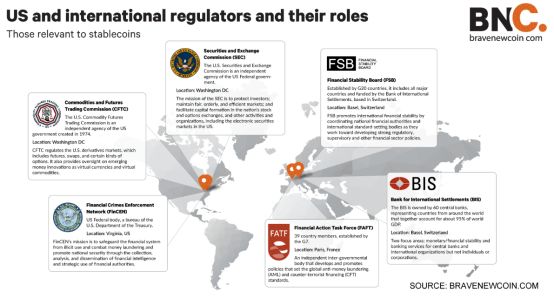Stablecoin will become a global regulatory focus in 2020: who are the main regulators and what is their current position?
Author: Andrew Gillick
Translation: Zoe Zhou
Source: Crypto Valley
Editor's note: The original title was "2020 Stablecoin Regulatory Landscape"
- New survey: 36% of U.S. small businesses accept virtual currency payments
- As the leader of DeFi, how does Ethereum promote the trillion-dollar financial market?
- Prediction 2020: Who Will Dominate the Spring of the Industrial Blockchain?
In 2019, with the advent of Facebook's proposed global digital currency Libra, even skeptical officials were forced to accept the existence of digital assets. In 2020, various countries and global regulators regarded stablecoins as the regulatory focus, and published various research reports on stablecoins in the past 12 months.
This article looks at the global regulatory landscape and identifies the major regulators. Who are they? What is their current position on stablecoins?

Structural change
In November this year, the European Central Bank President Christine Lagarde, speaking at the European Bank Conference in Frankfurt for the first time, talked about the structural changes in the global economy, alluding to blockchain and emerging technologies:
"As new technologies break the traditional supply chain and workplace organization, world trade is being reordered."
Lagarde added: "Persistent trade tensions and geopolitical uncertainty are leading to a slowdown in world trade growth. Since last year, the growth rate has been halved. This in turn has depressed global growth to its lowest level since the financial crisis.
Later in December, Lagarde acknowledged that stablecoins were an area of focus during her tenure. she says:
"Obviously, we have to respond to demand. And the European Central Bank should stay ahead."
This will elevate the status of digital currencies to the European Central Bank's global priorities in 2020.
The European Central Bank has also created a proof-of-concept DLT platform called EUROchain. The platform is aimed at bank intermediaries that can open central bank accounts and use central bank reserves to provide customers with central bank digital currencies.

G20 agenda
The G20 summit held in Osaka, Japan in June 2019 also included digital assets on the conference agenda. In their statement, G20 leaders acknowledged that blockchain technology can bring benefits to the global financial system and the wider economy. They reiterated that digital assets currently do not pose a threat to global financial stability. However, they recommend closely monitoring the development of digital currencies and continuously monitoring their potential risks.
In October 2019, the G20 Financial Stability Board sent a more urgent letter to the leaders of the G-20, stating that the "Global Stability Coin" is a potential threat to global stability. The letter was sent after Facebook's proposed acquisition of Libra stablecoin, which also acknowledged that "GSCs" could become systemically important and could eventually replace national currencies.

Because many stable currencies use the same mechanisms as real world currencies, such as currency boards, a basket of currencies, pegged to the US dollar, and even open market operations. As a result, they face the same risks as traditional currencies and may face the same regulations. With stablecoins, agents like designated market makers may have considerable market power and the ability to determine the price of stablecoins. This leaves room for market manipulation.
At the same time, the "Oracle problem" in the decentralized system has yet to be resolved. This dilemma describes a situation where price supply relies on third parties to maintain stable asset prices and external linkages. Late last year, the Synthetix stablecoin SUSD was attacked by a trading robot. The robot used Oracle's price information to issue more debt than collateral, which caused the stablecoin to go bankrupt.
The term "globally stable currency" has appeared in regulators to describe digital currencies like Libra. Although these currencies are not decentralized, they are likely to be widely adopted. A report on the stablecoin issued by the Group of Seven / BIS concluded,
"In addition to efforts to combat cross-jurisdictional money laundering and terrorist financing, GSCs may also have a significant negative impact on the transmission of monetary policy and financial stability at home and abroad."
At the same time, the Chinese government seems to have changed its attitude towards blockchain. Officially announced that China will use this technology as a core strategic pillar of the future economy, saying that China needs to make greater efforts on the blockchain in order to gain an advantage in competition with other major countries.

2019 regulator statement and publication schedule
June: Anti-Money Laundering Financial Action Task Force (FATF)-Special Recommendations on Anti-Terrorist Financing is recognized as a global anti-money laundering (AML) and counter-terrorism financing (CFT) standard. It updated the framework on "regulating digital asset service providers (VASPs) for the purpose of anti-money laundering and combating terrorist financing (AML / CFT), including licensed or registered digital asset service providers, and effective monitoring or supervision system."
August: European Central Bank-The European Central Bank has rarely published a technical white paper on stablecoins. The white paper concludes: "Despite the lack of regulatory review and recognition, uncertainty may hinder initiatives with a clear governance framework."
October: Financial Stability Board (FSB) / G20-FSB Chairman Randal K. Quarles wrote in a letter to G20 G20 leaders: "The introduction of" Global Stablecoin may pose a series of challenges for the regulatory community " , Especially because they have the potential to become systemically important, including the possibility of replacing domestic currencies. "
October: Group of Seven / BIS-Joint release of a draft document on stablecoins, stating that "Some risks will be amplified after the adoption of global stablecoins (GSCs), and new risks may Emerging. "Stablecoin plans built on existing large and cross-border customers may have the potential to expand rapidly.
November: Kenneth Blanco, the head of FinCEN, the US financial crime enforcement network, spoke at the Blockchain Conference "Chainalysis Blockchain Symposium", stating that regardless of the type of stablecoin, its managers must register with FinCEN as a money service business MSB. Kenneth Blanco emphasized in his speech that stablecoins are not a new concept in the digital currency field. FinCEN has always maintained the principle of technology neutrality to study stablecoins. In order to combat anti-money laundering (AML) and terrorist financing (CFT), stablecoin transactions should be Any other alternative currency transaction belongs to the category of currency transfer services. This means that a stablecoin trader is a money transporter as defined in the Bank Secrecy Act (BSA). Whether the stablecoin is supported by currency, commodities, or algorithms, it should follow the same rules. To this end, the administrator of the stablecoin must be registered as an MSB with FinCEN.
November: Fed's Financial Stability Report: The stablecoin plan, which builds on existing large cross-border customer networks, such as Facebook's Libra, has the potential to quickly achieve widespread adoption. These plans are called "Global Stablecoins." But if not properly designed and unregulated, it can negatively affect financial stability.
We will continue to update Blocking; if you have any questions or suggestions, please contact us!
Was this article helpful?
93 out of 132 found this helpful
Related articles
- Research Report | Finance must be the most suitable application area for blockchain (Part 1)
- Blockchain + notarization sets off a wave of landings, another example in Shanghai
- Listed company's blockchain business dynamics: 7 companies disclosed blockchain dynamics, and 5 new entrants
- The big brothers in the currency circle have shrunk the battlefield, and the popularity of traditional venture capital institutions has plummeted. How will the primary market of the blockchain play in the second half?
- Shanghai Blockchain Industry and Park Development Report: Yangpu District established the first 5 billion-scale blockchain industry guidance fund, which has a good foundation for industrial development
- Zhu Jiaming's New Work: Recognizing Future Currency Needs New Thought Resources
- KPMG report: China's fintech will enter the 2.0 era, and blockchain has been widely used in various fields of financial services






